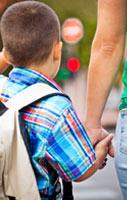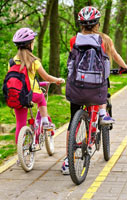Job Search
Tinies has hundreds of childcare jobs across the UK
Our Favourite Things to Think About During Road Safety Week
You can help keep your children safe and make a difference in your community by talking about road safety and getting involved this year during Road Safety Week
November 21st marks the beginning of Road Safety Week, organised by the charity Brake. It involves thousands of schools, organisations and community groups countrywide, and aims to raise awareness of and promote road safety in local communities.

Making the right choices
Road safety is a topic that is important for children of all ages; the older and more independent your child becomes, the more at risk they are, especially when they let go of your hand and start biking independently and eventually learning how to drive.
It's important to explore how to make safe choices with your children as they grow up - and how the choices they make while out in traffic might affect other people.
Whether you're a teacher looking to promote road safety amongst your students, or a parent seeking to make sure that your child is as safe as possible when they are out and about, here's what you need to remember when you're teaching children how to be road safe.
Teaching road safety
The ABC
Talk to your children about road safety and the things we need to do to make sure we are safe. One way to do this is by teaching them the ABC:
- Awareness: traffic is dangerous and can hurt people
- Behaviour: the things you need to do around traffic to stay safer
- Choices: how to make the right choices to help you stay safe, and help others stay safer too.
Talk about the different things these point represents, and how they are relevant for your child.
How to behave
Children should be taught how to behave around traffic from a young age. Make sure younger children are always holding your hand around traffic. Teach your children important safety words such as stop, go, look, listen and walk, don't run. Make sure they follow your instructions - you can practice this at home. As a guideline, Brake says, children below the age of 8 are too young to understand the risks that traffic poses and should not use roads without adults.
If your child attends a nursery or playgroup you can encourage the care provider to teach road safety through Brake's Beep Beep! Day.
You should also teach your children to always use the Green Cross Code (created by the Government) when crossing a road. Lead by example, if you make sure you follow the code every time you cross the road with your child, doing so will soon become second nature to them.
The Green Cross Code
- Find a safe place to cross
- Stop just before you get to the kerb
- Look all around for traffic and listen
- If traffic is coming, let it pass
- When it is safe, go straight across the road - do not run
Older children
As your child becomes older, they can be allowed more independence; but you should always take into consideration what the traffic is like in your local community, as well as the maturity of your child, before letting them venture out on their own. Remind them about the importance of using the Green Cross Code when crossing the road, even if it seems childish. Let them show you they can pay attention to traffic, and help them plan the safest possible route to where they are going.
Biking
Make sure your children are well aware of road safety before you let them go out biking on their own. Brake recommends that children younger than 10 shouldn't be cycling on roads by themselves.
Ensure children are always using a helmet and that their bike is well maintained, with working brakes and lights. Teach them where they can and cannot go, and to avoid big roads, bendy rural roads and busy towns without designated cycle lanes.
If you are concerned about specific traffic dangers in your local area, such as a lack of pavements, or fast traffic, you can start a campaign with the help of Brake to make a change.
Driving

As your child learns how to drive, their role in traffic changes and being responsible and aware of road safety becomes even more important. As well as the steps your child needs to take to stay safe when driving themselves, talk about who they should and shouldn't accept lifts from. Impress on them the importance of not accepting lifts from someone who has been drinking. Teach them to look out for their friends as well as themselves, and talk about what they can do to resist peer pressure.
If you think your child would be safer not accepting lifts from their friends, offer to drive them yourself, if at all possible, or help them find alternative modes of transport.
You can register to take part in Road Safety Week, 21-27 November 2016
